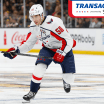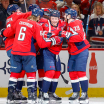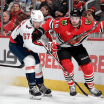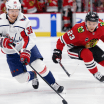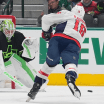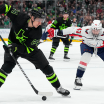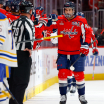Caps Look to Square Series in Game 4
Caps seek to shake off Game 3 double-overtime loss on Friday night in Boston

Three games into their best-of-seven, first-round playoff series, the Caps and the Boston Bruins have played extra hockey in all three and neither team has ever led by more than a goal. But Boston has scored consecutive goals twice in the series while Washington has done so once. The Bruins go into Friday night's Game 4 with a 2-1 lead in the series.
When the scene shifted from D.C. to Boston for Game 3, the Caps started Ilya Samsonov in goal, their third different starter in as many games. Rookie Vitek Vanecek was injured in Game 1, and replaced by Craig Anderson, who helped the Caps to a win by stopping 21 of 22 shots in a relief effort. Anderson started Game 2 - just his third start all year - and made 44 saves before losing 4-3 on Brad Marchand's goal in the first minute of overtime.
The overtime session in Game 3 lasted nearly 26 minutes before Boston's Craig Smith put an end to the night with a hustle goal, forcing a turnover in a casual behind-the-net exchange between Samsonov and Washington blueliner Justin Schultz, then slipping it inside the post from behind the goal line before the sophomore Washington goaltender could get properly set in his crease.
That's an extremely tough way to lose a hockey game at any time of year - particularly for a goalie who played as well Samsonov did in his career postseason debut - let alone double overtime of the Stanley Cup Playoffs.
"I talked to him [Wednesday] night," says Caps coach Peter Laviolette. "He played a heck of a game; I talked to him about that first and foremost. The miscommunication, there's two people involved there. The communication has got to be better. One person was thinking one thing and it seemed like a pretty harmless play, and it ended up poorly. We'll communicate these things to the players and we'll talk about the communication.
"The goalie exchanges with the defenseman had been excellent all night. We went back and looked at them and there weren't any other issues; they communicated well and they moved the puck well. But when you get into your third overtime game and then the double overtime of a game, the mental part of the game has to stay with the physical part of the game. You've got to be mentally sharp and physically sharp.
"I think it would have been easy for our [defenseman] to wheel the net, pick up that puck and break it out. And I also think that an option could have been to just chip it to the corner where our defenseman was going. It was just a miscommunication."
Washington is the only team in the series to own a lead at any intermission in this series; the Caps led 2-1 heading into the third period of Game 3. The Caps are also the only team to hold a third-period lead in this series; they were unable to ushed one-goal leads to victory in the final frames of both Games 2 and 3; Boston tied both games in the third and won both in overtime.
Now, Game 4 looms. Given Samsonov's splendid Game 3 showing, the Caps will at least have some continuity in net for the first time in the series. Now, they'll need some offense and perhaps some extra-man assertiveness to square the series and shrink it to a best-of-three set with two of those last three games in Washington.
Although the Caps did net the game's first goal on an Alex Ovechkin power-play marker in the second period of Game 3, their extra-man unit has lacked the luster needed to give them any separation in an intensely tight series.
Washington is 2-for-10 on the power play, but it had three first-period opportunities that went by the wayside in Game 3. With five power play chances in the first 36 minutes of Wednesday's game, the Caps might have achieved the scoreboard separation that's been so elusive for both sides in this series. The score has been tied for more than three-quarters of the minutes played in the series to date, so any small incremental improvements in any areas could make a difference.
"We were struggling on the breakouts and we weren't really timing it well with everyone," says Caps center Nicklas Backstrom. "So we struggled just to get into the zone. That's something we've got to be better at, because when you don't get it set up, it's hard to create chances.
"Yeah, we got one there in the second period, but I think in the playoffs you've got to really take advantage of that and make sure that if you're not scoring, you are at least getting some momentum out of it."
The Caps have opened the scoring in each of the last two games with a power-play. T.J. Oshie tipped home an Ovechkin shot to stake Washington to a 1-0 lead in Game 2. Boston featured the NHL's second best penalty killing success rate during the regular season, so it's not like the Bruins are pushovers. But it's an area where the Caps have room for improvement.
"I don't think we executed the way that we needed to early on to get us a big goal," says Laviolette. "From an execution standpoint, if you get a lot of power plays early in a game like that, that's a chance to grab hold of something. I think that we could have been a little bit sharper with what we were doing."



